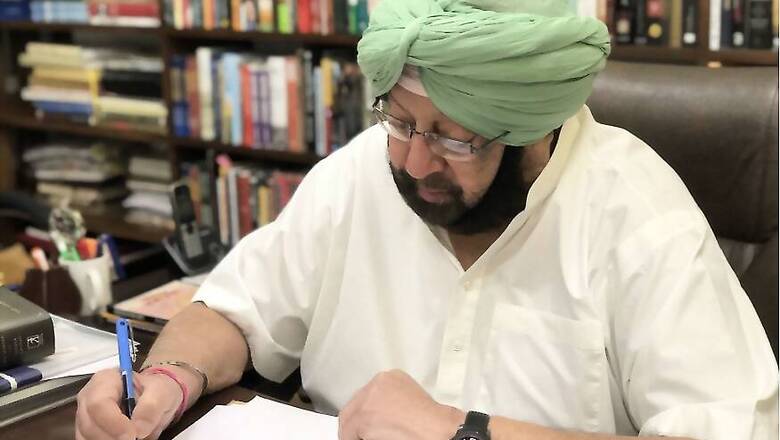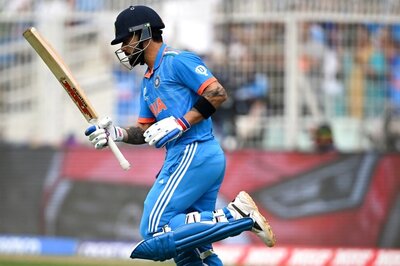
views
Chandigarh: Punjab Chief Minister Capt Amarinder Singh on Friday did a U-turn on his pre-poll promise of eradicating the drugs menace from Punjab. Instead, he said, “I had promised to break the backbone of drug trade in the state”, adding, “and I have done that”.
In an exclusive interview to CNN-News18’s Jyoti Kamal, the Punjab CM also admitted to the presence of black sheep in the police, claiming that he was trying to weed them out.
In order to fight the drug menace plaguing the state, the CM said the people hired by the state government will have to go through compulsory drug-screening. And when the time for their promotion comes, they will again be examined.
On being asked if the government is soft on big players in the business, the veteran Congress leader said that he will not arrest anyone or take action against anyone unless charges are proved.
Here are the edited excerpts from the interview.
Q: Before coming to power you had promised to the people that you would eradicate drug menace from Punjab within a month. It was a burning issue then and people listened to you and probably voted you to power on that promise. Did the drug menace end within a month? Allegations are being levelled against you that is hasn’t.
Capt Amarinder Singh: See, the first thing one should know is what I said at the time. I can even show it right now what I had said. I had said in Punjabi, 'main nasheyan da lak tod dunga (I’ll break the backbone of this thing and we are still on it)'. The main issue was that of chitta. It is not available today, and if it is, it’s very costly. It was Rs 1200 per gram earlier and today it is being sold at around Rs 6000 per gram. Death are taking place because new concoctions are being prepared. When I saw some of the bodies, they had needles still hooked to their arms. They had an instant death and god knows what they have been using because heroin has been more or less eradicated.
Q: Harsimrat Kaur Badal has alleged that the previous SAD government didn’t witness as many drug-related deaths during its tenure as have come to surface within a year of you assuming office.
Capt Amarinder Singh: Maybe heroin was more rampant during their regime which is less lethal than the current concoctions. Whatever it be - heroin, concoctions, anything - this ever increasing number of deaths is unacceptable. And the only method to deal with it is that we have to come down very hard. We have to involve people from the villages. They have awakened up to this and are helping the police in nabbing the drug addicts as well as the peddlers and smugglers. This is a good beginning. See, the police can only build pressure. During the days of terrorism, security forces used to build pressure, but it was only after the people stood against terrorism that it was wiped out. Time has come again for the people to rise up against drugs. When they will see what is happening to their children, this menace would be eradicated.
Q: When you came to power, the issue of drugs hogged the headlines in the very first month. Lately, this issue has again grabbed attention with political leaders making statements and counter-statements. Why did it crop up again?
Capt Amarinder Singh: Three-four days back I had clearly stated that we are going all out to eliminate this menace and the people who will be hired by the state government will have to go through drug-screening. And when the time for their promotion comes, they will again be examined. Be it the police or the civil service, all would have to go thorough drug-screening before being recruited or promoted.
Q: Do you think this dope test will yield any results?
Capt Amarinder Singh: Yes, a pressure will be there. Some will clear the dope test, some may use unfair means, but by and large it will definitely make a difference. Suppose, someone is 80 years of age and is taking 20 medicines a day and if something crops up during test, what can be said about that?
Q: We at CNN-News18 had conducted a sting operation which showed how a dope test can be manipulated or altered for few bucks. The government's intention seems good, but it is at the implementation level that these things take place, leading to failure.
Capt Amarinder Singh: See, this thing is rampant in the poorer sections of the society. Joblessness, frustration, failures - I have 50 per cent students in classes X and XII who have failed. These are things that draw the youth into drugs. The rich ones don’t necessarily take drugs. If someone does, they do it in parties – like the ones in Delhi. We don’t have it here. Here it is because of pure sense of frustration.
Q: It is being said that your government is going soft on big players while simply focusing on small drug peddlers and smugglers. No action is being taken against politicians or senior policemen allegedly involved in the trade.
Capt Amarinder Singh: First, the people we take into custody, it’s very clear that those who consume drugs be immediately sent to the rehabilitation centres - government or private. We have about 80 of them in government and 52 in private sector. Yesterday, a man was nabbed with 14 kg of heroin, that is for trade, that is the big fish, it is sold in grams, one or two. We will find out from where it comes, etc. But there are people who are much bigger than this, who are like, let’s say, national level players and now we are after them. But they have left the state. That’s why if you ask in Delhi, you’ll know that consumption of drugs has increased there.
Q: Two-three days back there were reports from Himachal that this menace of drugs has made inroads into the state. Do you think the drugs are being diverted to the neighbouring states?
Capt Amarinder Singh: It’s less in Rajasthan and Madhya Pradesh. I’ll tell you why, because they are allowed to grow it. Opium cultivation is allowed in Madhya Pradesh. They can grow and trade in it. In Rajasthan, you can’t grow it, but you can sell it. So it’s freely available. But this is not heroin. Here we are worried about heroin. That is a sure killer.
Q: Dr Dharamvir Gandhi shared the same thoughts when we spoke to him earlier. He said that traditional drugs like opium, marijuana were prevalent earlier, but as the noose was tightened on them, dangerous drugs like cocaine, heroin made inroads. He says that if these traditional drugs like opium and marijuana are legalised, then these bigger problems can be solved.
Capt Amarinder Singh: Mr Gandhi is a sitting Member of Parliament. He should get it passed there. He is an MP from Patiala, let him take it up in Parliament and if gets passed it would be on an all India basis.
Q: After a month of you coming to power we had gone to a village and found that drugs are being openly sold. Today we visited that village again and found no change. There is also a police post outside the village. Are the police becoming the weakest link in your campaign against drugs?
Capt Amarinder Singh: No, no. Not fair. It’s not fair to put all the policemen in the same basket. As I said, there are black sheep in every department, we too have them. Like you said that there is a police post there. Obviously, they might be involved. But we have 12,700 villages and you mentioned a single village. There are many villages where no sale of drugs is taking place. And there are some where 60 to 70 per cent youth are indulging into drugs. We are concentrating on those.
Q: Former minister Lakshmi Kanta Chawla spoke to us and said that during the SAD-BJP regime, SHOs were given targets to put certain number of people in jail. Were those targets given because you had built a heavy pressure and they wanted to show that the government was acting against drugs? Do you agree with this?
Capt Amarinder Singh: There were talks that Akalis were themselves involved in the trade. They tried to show that they were clean and were clamping down on the drug mafia. Even common people travelling on bicycles were nabbed and put behind bars. These sort of things were taking place. We have not allowed it at all.
Q: The inmate capacity of your jails is around 22 to 23 thousand. Around 10,000 people involved in drugs have been already incarcerated. Now you are saying that more people would be arrested. Is it like majority of them are involved in drug related crimes?
Capt Amarinder Singh: No, we haven’t given any target to arrest a particular number of people. These inmates are those who had been nabbed for other routine matters. Five thousand of them are convicted and the remaining are under-trials. A few days ago, the High Court released many of them - the ones who were arrested by the previous regime. Such arrests won’t help. See, in our jails, drugs are available, everything is available. We are clamping down on that. But there are some who have never taken drugs in their entire life but they come out as addicts. We have to be very careful about that also. We have asked for central support for this. The Home Ministry has given us two companies of CISF to monitor the inner-cordon where the hardcore criminals, druggists and all, are lodged.
Q: When you formed the Special Task Force, it was said that it was short of the required manpower, around 2200, I suppose. Do you think that adequate number of personnel should have been provided?
Capt Amarinder Singh: First, let me tell you why a Special Task Force was needed. I formed it because I had chosen Mr Harpreet Sidhu to head it. He was a part of the anti-Naxal operations in Chhattisgarh. I know him, he is a tough officer and I had called him from there. He was on deputation of Central services and so he couldn’t come for another two years. The only way he could come was if he came to the Chief Minister’s office. I had requested Rajnath Singh Ji that I need him for the purpose, but he said that he can only come to me. So we set that up in my office as an organization for this purpose. Now we are bringing it as one of the forces in the police, like the independent forces - intelligence, vigilance. STF will be independent. Why we brought it because they have around 300 people right now who are operating. You cannot operate individually. You have to utilise your SHOs, etc, from where you get information. If I go as an STF officer, whom do I contact? I have to contact the concerned SHO, DSP, but then, why will they co-operate with me? Because he has got nothing to do with me. It’s a separate organisation all together. But if we bring him as a part of the main Punjab Police then he is part of the force. It’s not only 3000, he will then have 80,000 personnel available from our police force for utilisation.
Q: Do you think that the police are also involved in drug trade?
Capt Amarinder Singh: Certainly, it might be there. Like you mentioned about the police post. They might not be acting because they must be getting paid. There are black sheep and will weed them out gradually.
Q: Like you said that more deaths are taking place because of deadly concoctions. Will you please shed more light on it?
Capt Amarinder Singh: You see, heroin used to kill. Bhang (marijuana) etc, was nothing as compared to it. Heroin killed, eventually they used to call it Chitta. It caused death a hundred per cent. Heroin came from Pakistan. Afghanistan, Pakistan, India - this was the triangle that was being followed. The BSF has deployed five additional battalions on the Punjab border and they have blocked the route. Then, there is third cordon of the Punjab Police. So we have effectively sealed the area. Now the route followed is through Rajasthan to Delhi and then Punjab. It still comes from Pakistan. The ISI is the mischief maker. It is behind all this. They want to ruin us.
Q: Before elections, you donned a bold and daring image. It is being alleged that Capt Amarinder Singh doesn’t show his bold side now. Where is that boldness, aggression now?
Capt Amarinder Singh: There is nothing like that. See, it’s been 52 years since I entered politics. One learns over the period of time. Now it’s the time for action and not waving a stick. We are trying to bring in jobs, we are eradicating drugs, we are changing the cropping patterns to generate more income for farmers, so we have spread out our activities.
Q: People involved in drugs are likely criminals, and if they are criminals then they must be gangsters and would be operating with other gangs and the ISI might fund them. Do you also worry that if the drug trade goes on unabated, then these associated problems will also increase?
Capt Amarinder Singh: Drugs is a different issue. Gangsters are involved, but I have publically warned them, put down your arms or face consequences. Some of them have been shot dead. We will not take any nonsense from them. Either they obey law of the land or they will have to face the consequences. And then the arms come from Pakistan. So we have had, I don’t wish to give the numbers, seized many weapons in a year which have come from Pakistan.
Q: Do you think that the problem of drugs will finally end in the coming years, or is this a problem which will take years to be eradicated?
Capt Amarinder Singh: I think the way we are moving ahead, and the way people are awakening up the process has started again. The peddlers, smugglers, addicts are being nabbed by villagers and handed over to police. It is this development that will bring about success.



















Comments
0 comment